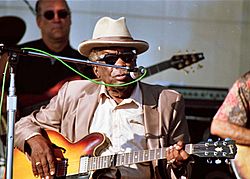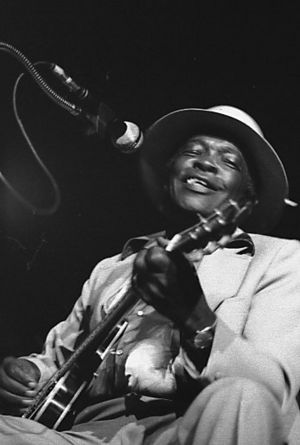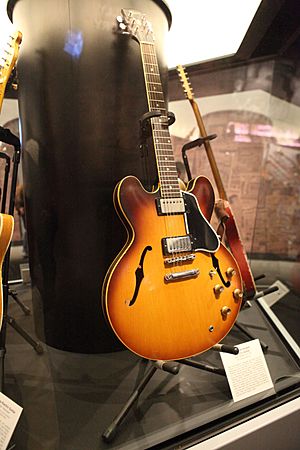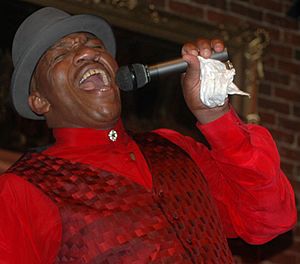John Lee Hooker facts for kids
Quick facts for kids
John Lee Hooker
|
|
|---|---|

John Lee Hooker at the Long Beach Blues Festival, 1997
|
|
| Background information | |
| Born | August 22, 1917 Coahoma County, Mississippi |
| Died | June 21, 2001 (aged 83) |
| Genres | Blues |
| Occupation(s) | singer-songwriter |
| Instruments | Guitar |
| Years active | 1948-2001 |
| Labels | Vee-Jay, Chess Records and others |
John Lee Hooker (August 22, 1912 or 1917 – June 21, 2001) was an American blues singer, songwriter, and guitarist. The son of a sharecropper, he rose to prominence performing an electric guitar-style adaptation of Delta blues. Hooker often incorporated other elements, including talking blues and early North Mississippi Hill country blues. He developed his own driving-rhythm boogie style, distinct from the 1930s–1940s piano-derived boogie-woogie.
Some of his best known songs include "Boogie Chillen'" (1948), "Crawling King Snake" (1949), "Dimples" (1956), "Boom Boom" (1962), and "One Bourbon, One Scotch, One Beer" (1966). Several of his later albums, including The Healer (1989), Mr. Lucky (1991), Chill Out (1995), and Don't Look Back (1997), were album chart successes in the U.S. and U.K. The Healer (for the song "I'm In The Mood") and Chill Out (for the album) both earned him Grammy wins as well as Don't Look Back, which went on to earn him a double-Grammy win for Best Traditional Blues Recording and Best Pop Collaboration with Vocals (with Van Morrison).
Contents
Early life
Hooker's date of birth is a subject of debate; the years 1912, 1915, 1917, 1920, and 1923 have been suggested. Most sources give 1917, though at times Hooker stated he was born in 1920. Information in the 1920 and 1930 censuses indicates that he was born in 1912. In 2017, a series of events took place to celebrate the purported centenary of his birth.
It is believed that he was born in Tutwiler, Mississippi, in Tallahatchie County, although some sources say his birthplace was near Clarksdale, in Coahoma County. He was the youngest of the 11 children of William Hooker (born 1871, died after 1923), a sharecropper and Baptist preacher, and Minnie Ramsey (born c. 1880, date of death unknown). In the 1920 federal census, William and Minnie were recorded as being 48 and 39 years old, respectively, which implies that Minnie was born about 1880, not 1875. She was said to have been a "decade or so younger" than her husband (Boogie Man, p. 23), which gives additional credibility to this census record as evidence of Hooker's origins.
The Hooker children were home-schooled. They were permitted to listen only to religious songs; the spirituals sung in church were their earliest exposure to music. In 1921, their parents separated. The next year, their mother married William Moore, a blues singer, who provided John Lee with an introduction to the guitar (and whom he would later credit for his distinctive playing style).
Moore was his first significant blues influence. He was a local blues guitarist who, in Shreveport, Louisiana, learned to play a droning, one-chord blues that was strikingly different from the Delta blues of the time.
Another influence was Tony Hollins, who dated Hooker's sister Alice, helped teach Hooker to play, and gave him his first guitar. For the rest of his life, Hooker regarded Hollins as a formative influence on his style of playing and his career as a musician. Among the songs that Hollins reputedly taught Hooker were versions of "Crawlin' King Snake" and "Catfish Blues".
At the age of 14, Hooker ran away from home, reportedly never seeing his mother or stepfather again. In the mid-1930s, he lived in Memphis, Tennessee, where he performed on Beale Street, at the New Daisy Theatre and occasionally at house parties.
He worked in factories in various cities during World War II, eventually getting a job with the Ford Motor Company in Detroit in 1943. He frequented the blues clubs and bars on Hastings Street, the heart of the black entertainment district, on Detroit's east side. In a city noted for its pianists, guitar players were scarce. Hooker's popularity grew quickly as he performed in Detroit clubs, and, seeking an instrument louder than his acoustic guitar, he bought his first electric guitar.
Earlier career
Hooker's recording career began in 1948, when Modern Records, based in Los Angeles, released a demo he had recorded for Bernie Besman in Detroit. The single, "Boogie Chillen'", became a hit and the best-selling race record of 1949. Despite being illiterate, Hooker was a prolific lyricist. In addition to adapting traditional blues lyrics, he composed original songs. In the 1950s, like many black musicians, Hooker earned little from record sales, and so he often recorded variations of his songs for different studios for an up-front fee. To evade his recording contract, he used various pseudonyms, including John Lee Booker (for Chess Records and Chance Records in 1951–1952), Johnny Lee (for De Luxe Records in 1953–1954), John Lee, John Lee Cooker, Texas Slim, Delta John, Birmingham Sam and his Magic Guitar, Johnny Williams, and the Boogie Man.
Later career and death
Beginning in 1962, Hooker gained greater exposure when he toured Europe in the annual American Folk Blues Festival. His "Dimples" became a successful single on the UK Singles Charts in 1964, eight years after its first US release. Hooker began to perform and record with rock musicians. One of his earliest collaborations was with British blues rock band the Groundhogs. In 1970, he recorded the joint album Hooker 'n Heat, with the American blues and boogie rock group Canned Heat, whose repertoire included adaptations of Hooker songs. It became the first of Hooker's albums to reach the Billboard charts, peaking at number 78 on the Billboard 200. Other collaboration albums soon followed, including Endless Boogie (1971) and Never Get Out of These Blues Alive (1972), which included Steve Miller, Elvin Bishop, Van Morrison, and others.
Hooker appeared in the 1980 film The Blues Brothers. He performed "Boom Boom" in the role of a street musician. In 1989, he recorded the album The Healer with Carlos Santana, Bonnie Raitt, and others. The 1990s saw additional collaboration albums: Mr. Lucky (1991), Chill Out (1995), and Don't Look Back (1997) with Morrison, Santana, Los Lobos, and additional guest musicians. His re-recording of "Boom Boom" (the title track for his 1992 album) with guitarist Jimmie Vaughan became Hooker's highest charting single (number 16) in the UK. Come See About Me, a 2004 DVD, includes performances filmed between 1960 and 1994 and interviews with several of the musicians.
Hooker died in his sleep on June 21, 2001, in Los Altos, California. He is interred at the Chapel of the Chimes in Oakland, California. He was survived by eight children, 19 grandchildren, and numerous great-grandchildren.
Awards and recognition
Among his many awards, Hooker was inducted into the Blues Hall of Fame in 1980, and the Rock and Roll Hall of Fame in 1991. He was awarded the Grammy Lifetime Achievement Award in 2000 and has a star on the Hollywood Walk of Fame.
Two of his songs, "Boogie Chillen" and "Boom Boom", are included in the Rock and Roll Hall of Fame's list of the "500 Songs That Shaped Rock and Roll". "Boogie Chillen" is also included in the Recording Industry Association of America's list of the "Songs of the Century".
In 2007, John Lee Hooker was voted into the Michigan Rock and Roll Legends Hall of Fame.
Film
- The Blues Brothers on Maxwell Street (Chicago) outside Aretha Franklin's restaurant (1980)
- John Lee Hooker & Furry Lewis DVD (1995)
- John Lee Hooker Rare Performances 1960–1984 DVD (2002)
- Come See About Me DVD (2004)
- John Lee Hooker: Bits and Pieces About … DVD and CD (2006)
Grammy Awards
- Best Traditional Blues Recording, 1990, for I'm in the Mood, with Bonnie Raitt
- Best Traditional Blues Album, 1995, for Chill Out
- Best Traditional Blues Recording, 1998, for Don't Look Back
- Best Pop Collaboration with Vocals, 1998, Don't Look Back, with Van Morrison
- Grammy Lifetime Achievement Award, 2000
Discography
Charting singles
| Year | Title A-side / B-side |
Label | Peak chart position |
||
|---|---|---|---|---|---|
| US 100 |
US R&B |
UK Singles |
|||
| 1948 | "Boogie Chillen'" / "Sally May" | Modern 627 | — | 1 | — |
| 1949 | "Hobo Blues" / "Hoogie Boogie" | Modern 663 | — | 5 / 9 | — |
| "Crawlin' King Snake" / "Drifting from Door to Door" | Modern 714 | — | 6 | — | |
| 1950 | "Huckle Up Baby" / "Canal Street Blues" | Sensation 26 | — | 15 | — |
| 1951 | "I'm in the Mood" / "How Can You Do It" | Modern 835 | 30 | 1 | — |
| 1958 | "I Love You Honey" / "You've Taken My Woman" | Vee-Jay 293 | — | 29 | — |
| 1960 | "No Shoes" / "Solid Sender" | Vee-Jay 349 | — | 21 | — |
| 1962 | "Boom Boom" / "Drug Store Woman" | Vee-Jay 483 | 60 | 14 | — |
| 1964 | "Dimples" / "I'm Leaving" | $tateside SS 297 | — | — | 23 |
| 1992 | "Boom Boom" / "Homework" | Point Blank/ Virgin POB 3 |
— | — | 16 |
| 1993 | "Boogie at Russian Hill" / "The Blues Will Never Die" | Point Blank/ Virgin POB 4 |
— | — | 53 |
| "Gloria" (remake) / "It Must Be You" | Exile VANS 11 | — | — | 31 | |
| 1995 | "Chill Out (Things Gonna Change)" / "Tupelo" (remake) |
Point Blank/ Virgin POB 10 |
— | — | 45 |
| 1998 | "Baby Lee" (remake) / "Cuttin' Out" (remake) / "No Substitute" |
Silvertone ORE CD 21 | — | — | 65 |
| "—" denotes a release that did not chart | |||||
Images for kids
See also
 In Spanish: John Lee Hooker para niños
In Spanish: John Lee Hooker para niños





